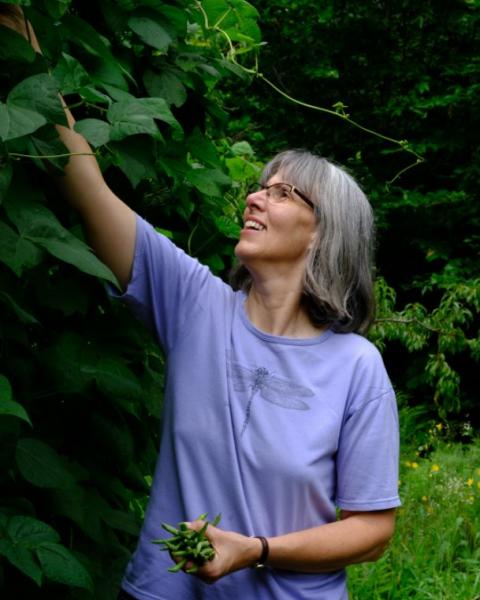The Master Gardener program started at Washington State University in 1973. The name came from the German word “Gartenmeister,” which roughly translated means “Master Gardener.” The originators of the program had worked in Germany and learned that Germans bestow titles for hard‐earned proficiency levels in various crafts.
The New Hampshire program started in 1993. Master Gardeners are trained volunteers, who share their enthusiasm for gardening with the general public.
By serving as volunteer educators in their community, Master Gardeners help UNH Cooperative Extension reach more people.
A Master Gardener is a:
- volunteer who is willing to work on horticultural projects that extend the outreach capabilities of UNH Cooperative Extension
- gardener with interest, experience and knowledge of any type of gardening
- teacher who is eager to share gardening knowledge and experience with others
- student curious to learn scientifically-based gardening information
This is a volunteer program and is not to be used for professional advancement or commercial advertising.
Some projects that Master Gardeners are involved with:
- Education Center Infoline - answering garden questions from the public
- School/youth gardens - using school gardens to teach many topics
- Community gardens - helping residents learn to grow their own food
- Historical museum and nature center garden interpretation - providing interpretation about past and current garden benefits
- Speakers Bureau - presenting approved programs to garden clubs, library groups and other civic organizations
- Writing articles for local publications - sharing knowledge via written media
- Ask a Master Gardener Info Booth - providing knowledge at Farmers’ Markets, community fairs, public expos
Next In-person Class
The next Extension Master Gardener in-person volunteer training will take place in the spring of 2026 (March 5-May 21), on 12 Thursdays from 9:00-4:00. The location has not been chosen yet.
Anyone who is interested in participating may apply using the link below. Applications are welcome at any time and all applications will be kept on file and reviewed prior to the next class.
Participants are chosen in part due to their location so that regional cohorts are formed and travel needs are reduced. Location of applicants may dictate the next location so early applications are helpful in determining future training sites.
If the dates and location are not convenient, applications may be submitted for future classes which will take place in other parts of the state. We will also be offering a hybrid class in 2026, open to a wider geographic area.
The fee for the class is $300 plus $25 for a printed manual (electronic versions are available for free). Financial assistance is available. Anyone who is interested in the training must complete an application and qualified applicants will be interviewed prior to acceptance into the class.
Master Gardener Hybrid Training Class
If in-person participation is not convenient for you, our hybrid training offers a combination of self-paced on-line learning, evening Zoom meetings and a few Saturday in-person and hands-on opportunities.
Watch for more information for the 2026 hybrid class schedule.
Questions? Contact Ruth Smith at ruth.smith@unh.edu.
The cost of the training is $300 plus a $45 access fee for the on-line course materials. This will be available to you after the course ends as well. Financial aid is available for anyone who needs assistance.
